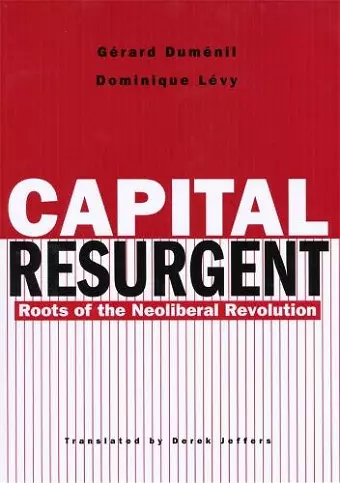Capital Resurgent
Roots of the Neoliberal Revolution
Gérard Duménil author Dominique Lévy author Derek Jeffers translator
Format:Hardback
Publisher:Harvard University Press
Published:30th May '04
Currently unavailable, and unfortunately no date known when it will be back

This remarkable book offers a closely argued and persuasive interpretation of the political economy of Europe and the U.S. from 1970 to the present, based on a much wider discussion ranging in time from the late 19th century, and touching on the history of the industrializing countries of Asia and Latin America. The interpretation of contemporary political economy offers fresh and challenging perspectives to the ongoing debate about world economic policy. -- Duncan K. Foley, The New School for Social Research
The authors show that, despite free market platitudes, neoliberalism was a planned effort by financial interests against the postwar Keynesian compromise, and the cluster of neoliberal policies is an expression of the power of finance in the world economy. The authors call for stabilizing the world economy to avert economic disaster.
The advent of economic neoliberalism in the 1980s triggered a shift in the world economy. In the three decades following World War II, now considered a golden age of capitalism, economic growth was high and income inequality decreasing. But in the mid-1970s this social compact was broken as the world economy entered the stagflation crisis, following a decline in the profitability of capital. This crisis opened a new phase of stagnating growth and wages, and unemployment. Interest rates as well as dividend flows rose, and income inequality widened.
Economists Gérard Duménil and Dominique Lévy show that, despite free market platitudes, neoliberalism was a planned effort by financial interests against the postwar Keynesian compromise. The cluster of neoliberal policies--including privatization, liberalization of world trade, and reduction in state welfare benefits--is an expression of the power of finance in the world economy.
The sequence of events initiated by neoliberalism was not unprecedented. In the late nineteenth century, when economic conditions were similar to those of the 1970s, a structural crisis led to the first financial hegemony culminating in the speculative boom of the late 1920s. The authors argue persuasively for stabilizing the world economy before we run headlong into another economic disaster.
This remarkable book offers a closely argued and persuasive interpretation of the political economy of Europe and the U.S. from 1970 to the present, based on a much wider discussion ranging in time from the late 19th century, and touching on the history of the industrializing countries of Asia and Latin America. The interpretation of contemporary political economy offers fresh and challenging perspectives to the ongoing debate about world economic policy. -- Duncan K. Foley, The New School for Social Research
- Nominated for William H. Riker Book Award 2005
- Nominated for Allan Sharlin Memorial Award 2005
ISBN: 9780674011588
Dimensions: unknown
Weight: 513g
256 pages